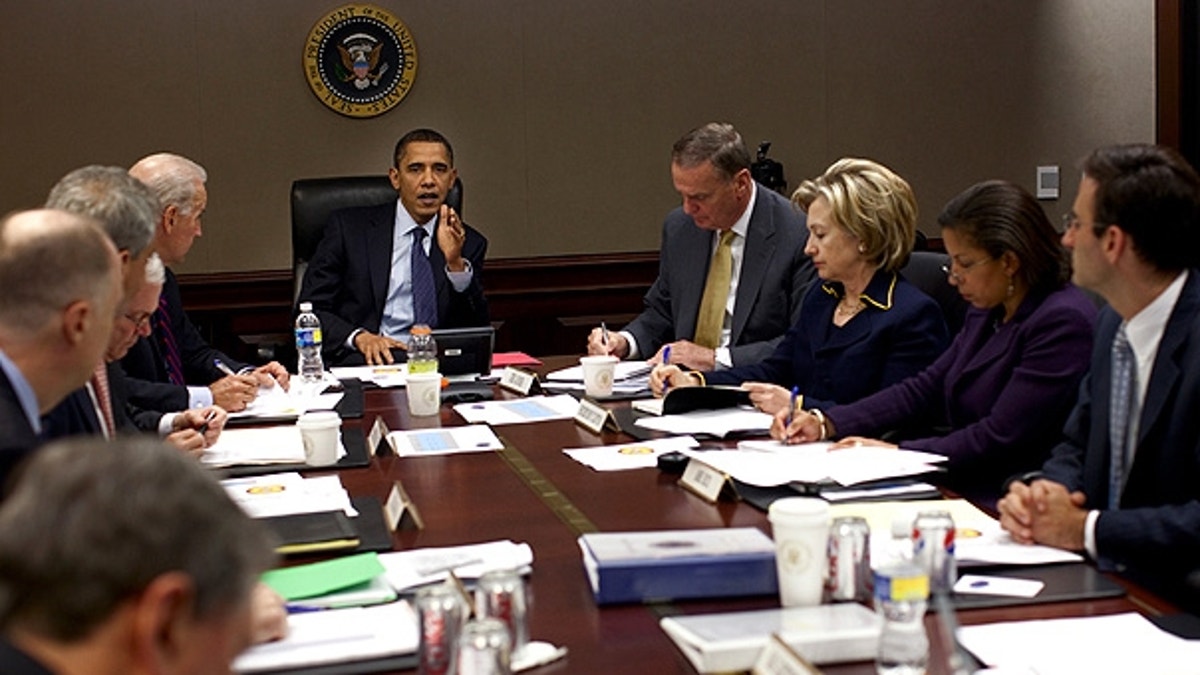
Nov. 23, 2009: President Obama holds a meeting on Afghanistan in the Situation Room. (White House)
President Obama, after being warned repeatedly by his advisers about the threat of another terror attack on U.S. soil, said in an interview two months ago that the United States could "absorb" another strike.
The comment was included in the new book by journalist Bob Woodward, "Obama's Wars," excerpts of which were reported by The Washington Post and The New York Times.
The book depicts the contentious debate the Obama administration endured to craft a new strategy in Afghanistan. According to the Post, Obama spent the bulk of the exhaustive sessions pressing for an exit strategy and resisting efforts to prolong and escalate the war.
Despite warnings of another attack, he suggested the United States could weather a new strike.
"We can absorb a terrorist attack. We'll do everything we can to prevent it, but even a 9/11, even the biggest attack ever . . . we absorbed it and we are stronger," Obama reportedly said.
According to the book, Obama said, "I have two years with the public on this" and pressed advisers for ways to avoid a big escalation in the Afghanistan war.
"I'm not doing long-term nation-building. I am not spending a trillion dollars," he reportedly told Defense Secretary Robert Gates and Secretary of State Hillary Clinton in October 2009. "I want an exit strategy," he said at one meeting. Privately, he told Vice President Biden to push his alternative strategy opposing a big troop buildup in meetings.
While Obama ultimately rejected the alternative plan, the book says, he set a withdrawal timetable because, "I can't lose the whole Democratic Party."
The comment on absorbing an attack drew tough criticism Wednesday from Liz Cheney, daughter of former Vice President Cheney and chairwoman of Keep America Safe.
"This comment suggests an alarming fatalism on the part of President Obama and his administration," she said in a statement. "Once again the president seems either unwilling or unable to do what it takes to keep this nation safe. The president owes the American people an explanation."
But a senior administration official defended the depiction of the president's actions.
"The president comes across in the review and throughout the decision-making process as a commander in chief who is analytical, strategic and decisive, with a broad view of history, national security and his role," the official told Fox News, describing the debates as "well known."
Lt. Gen. Douglas E. Lute, the president's Afghanistan adviser, is described as believing the president's review of the Afghanistan war did not "add up" to the decision he made. Richard Holbrooke, the president's special representative for Afghanistan and Pakistan, is quoted as saying of the strategy, "It can't work," according to The New York Times.
Obama was among administration officials that Woodward interviewed for the book.
Although the internal divisions described by Woodward have become public, the book suggests that they were even more intense than previously known and offers new details.
Gen. David Petraeus described White House senior adviser David Axelrod as a "complete spin doctor;" Biden called veteran diplomat Holbrooke "the most egotistical bastard I've ever met."
A number of administration officials expressed scorn for national security adviser James Jones, the Times said. The Post said that Jones, in turn, described Obama's political advisers as the "Politburo" and the "Mafia."
Adm. Mike Mullen, chairman of the Joint Chiefs of Staff, thought his vice chairman, Gen. James Cartwright, went behind his back, while Cartwright dismissed Mullen because he hadn't fought in a war.
The book recounts incidents in which Adm. Dennis Blair, then the national intelligence director, fought with Rahm Emanuel, the White House chief of staff, and John Brennan, the counterterrorism adviser.
It also reports that the U.S. has intelligence showing that Afghan President Hamid Karzai has been diagnosed with bipolar disorder and that he was on medication.
The Associated Press contributed to this report.
























